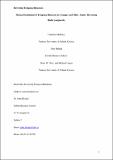| dc.contributor.author | McGreal, Catherine | |
| dc.contributor.author | Hyland, John | |
| dc.contributor.author | O'Hora, Denis | |
| dc.contributor.author | Hogan, Michael | |
| dc.date.accessioned | 2016-06-03T12:51:30Z | |
| dc.date.issued | 2016-05-12 | |
| dc.identifier.citation | McGreal, Catherine, Hyland, John, O’ Hora, Denis, & Hogan, Michael. (2016). Mutual Entailment of Temporal Relations in Younger and Older Adults: Reversing Order Judgments. The Psychological Record, 1-10. doi: 10.1007/s40732-016-0182-3 | en_IE |
| dc.identifier.issn | 2163-3452 | |
| dc.identifier.uri | http://hdl.handle.net/10379/5854 | |
| dc.description.abstract | For temporal relations, mutually entailed relations are different to those directly trained; we learn that A occurred before B and derive that B occurred after A. Deriving such relations results in lower accuracy and slower response speeds compared to derived relations identical to those trained. The ability of an individual to derive relations different to those trained is a measure of relational flexibility and predicts performance on standard cognitive tests. In the current study, 23 younger (M = 19 years) and 23 older (M = 61 years) participants observed pairs of stimuli presented consecutively (A B) and then evaluated statements including the stimuli in the same (A BEFORE B) or reversed order (B AFTER A). Judgements on reversed ( after ) statements resulted in lower accuracy and slower response speeds than those presented in the same order ( before ) for both older and younger groups. Older adults exhibited deficits in relational flexibility compared to younger adults, such as slower progression through experimental phases, particularly in correctly responding to reversed statements. Older participants also demonstrated higher error rates on foil statements and responded more slowly than younger participants. The findings suggest that older adults may benefit from training strategies focused on relational flexibility. | en_IE |
| dc.format | application/pdf | en_IE |
| dc.language.iso | en | en_IE |
| dc.publisher | Springer Verlag | en_IE |
| dc.relation.ispartof | The Psychological Record | en |
| dc.rights | Attribution-NonCommercial-NoDerivs 3.0 Ireland | |
| dc.rights.uri | https://creativecommons.org/licenses/by-nc-nd/3.0/ie/ | |
| dc.subject | Stimulus relations | en_IE |
| dc.subject | Age | en_IE |
| dc.subject | Relational flexibility | en_IE |
| dc.subject | Mutual entailment | en_IE |
| dc.subject | Psychology | en_IE |
| dc.title | Mutual entailment of temporal relations in younger and older adults: reversing order judgments | en_IE |
| dc.type | Article | en_IE |
| dc.date.updated | 2016-06-02T11:01:12Z | |
| dc.identifier.doi | 10.1007/s40732-016-0182-3 | |
| dc.local.publishedsource | http://link.springer.com/article/10.1007%2Fs40732-016-0182-3 | en_IE |
| dc.description.peer-reviewed | peer-reviewed | |
| dc.contributor.funder | |~| | |
| dc.description.embargo | 2017-05-12 | |
| dc.internal.rssid | 11073720 | |
| dc.local.contact | Denis O'Hora, School Of Psychology, Ambe - Room 1032, Arts Millennium Building Extension, Nui Galway. 5126 Email: denis.ohora@nuigalway.ie | |
| dc.local.copyrightchecked | No | |
| dc.local.version | ACCEPTED | |
| nui.item.downloads | 289 | |


